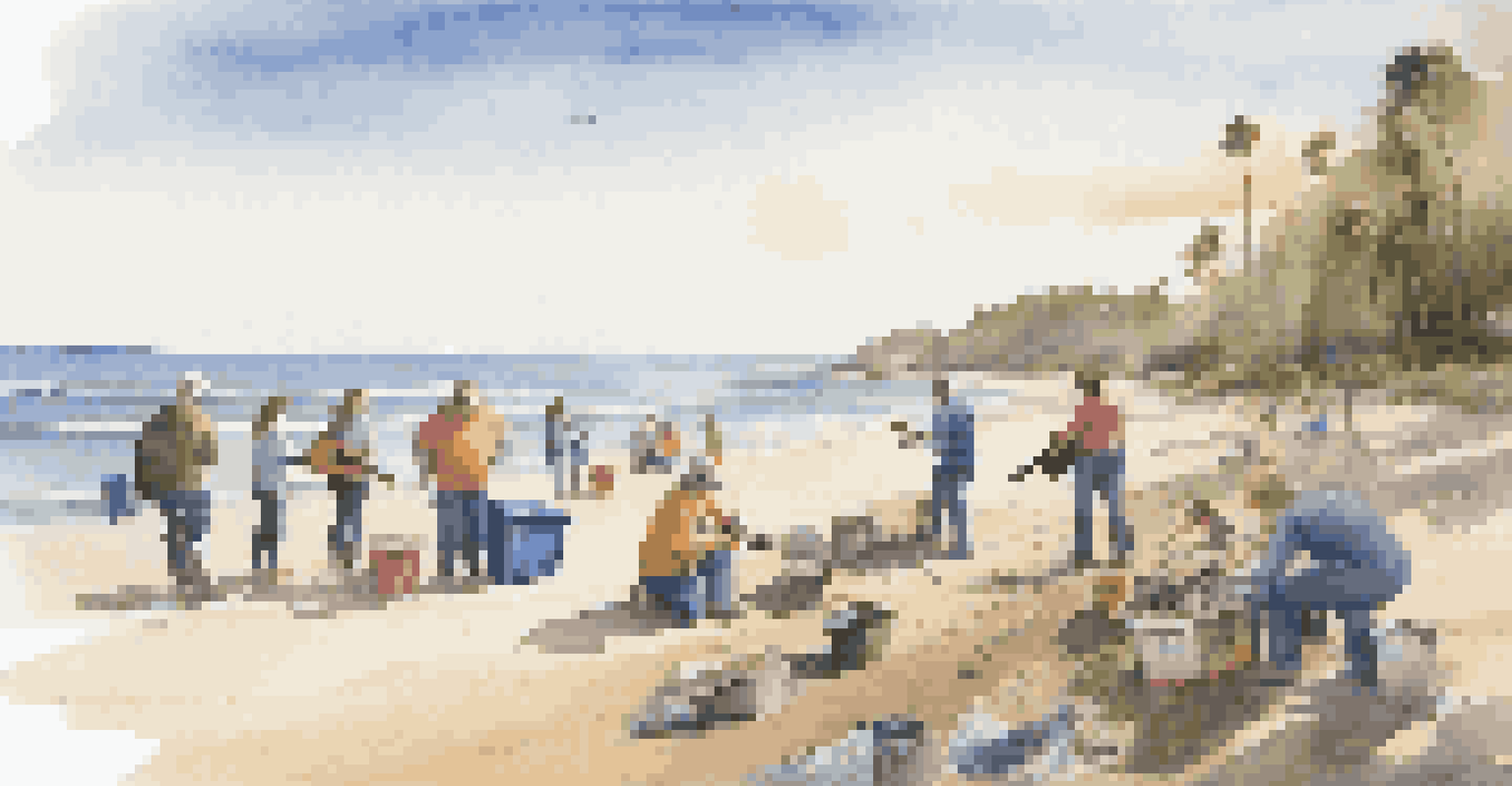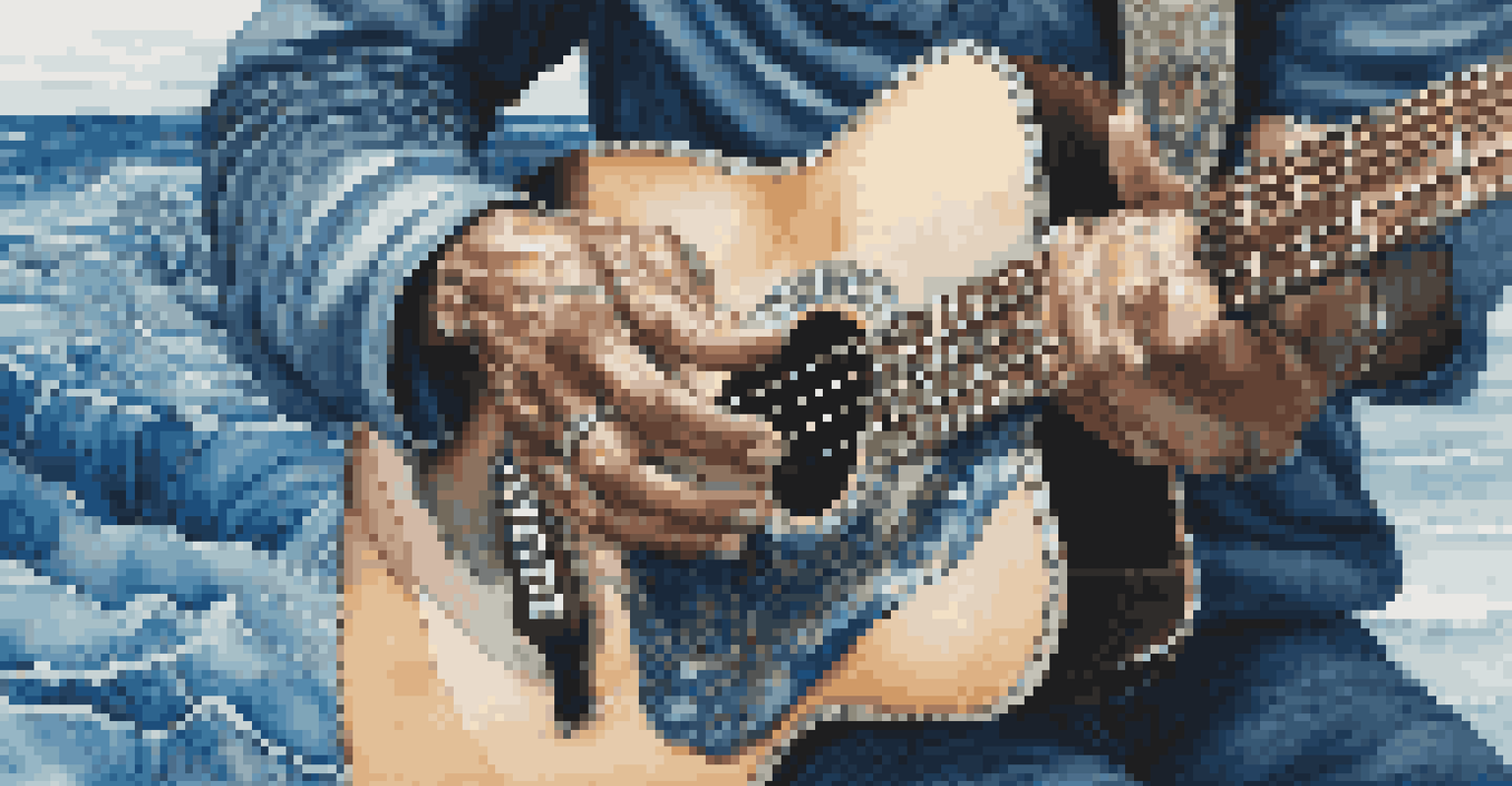Musicians Advocating for Ocean Conservation Through Music

The Power of Music in Environmental Advocacy
Music has an incredible ability to connect people and evoke emotions. When musicians use their platform to advocate for ocean conservation, they tap into this power to raise awareness and inspire change. Think of it as casting a net of influence, where each note and lyric can reach hearts and minds far beyond the concert stage.
Music can change the world because it can change people.
By combining melodies with messages about ocean health, these artists create a unique blend of art and activism. This approach not only entertains but also educates listeners about pressing issues like plastic pollution and climate change. Audience members leave concerts not just with a great experience, but with newfound knowledge and a sense of responsibility.
Musicians like Jack Johnson and Billie Eilish have shown that music can be a catalyst for environmental action. Through their songs and live performances, they highlight the beauty of the ocean while urging fans to protect it, demonstrating that art can have a profound impact on ecological awareness.
Prominent Musicians Leading the Charge
Several high-profile musicians have taken a stand for ocean conservation, using their fame to amplify the cause. Artists like Coldplay have made waves by organizing charity concerts specifically aimed at supporting ocean clean-up efforts. Their global reach means that messages about ocean health resonate with millions, making a significant impact.

Similarly, the band Pearl Jam has partnered with organizations like Surfrider Foundation to promote ocean conservation through their tours. By integrating environmental messages into their shows, they encourage fans to engage with conservation efforts long after the music fades. This blend of passion for music and commitment to the environment is inspiring a new generation of activists.
Music as a Catalyst for Change
Musicians utilize their platforms to raise awareness about ocean conservation, blending art with activism to inspire their audiences.
These musicians not only raise funds but also inspire their fans to take personal actions, such as reducing plastic use and participating in local clean-ups. Their influence demonstrates how powerful music can be when it serves a greater purpose, creating a ripple effect that extends far beyond the stage.
Grassroots Movements and Local Artists
While big-name artists play a crucial role, grassroots movements led by local musicians are equally important in the fight for ocean conservation. Community events, open mics, and local festivals often feature artists who use their talents to raise awareness about marine issues. These smaller gatherings foster a sense of community and collective responsibility.
The power of music can bring people together, and it can be a great force for change.
For example, local bands might perform at beach clean-up events, turning a day of service into a celebration of music and community spirit. This not only brings people together but also reinforces the message that everyone can contribute to ocean conservation, no matter how small their efforts may seem.
These local artists often connect with their audience on a personal level, making the call for ocean protection feel more immediate and relatable. Their music becomes a tool for empowerment, encouraging individuals to take action in their own communities, thereby cultivating a strong culture of environmental stewardship.
The Role of Music Festivals in Ocean Activism
Music festivals have become epicenters for environmental advocacy, with many organizers prioritizing sustainability and ocean conservation. Events like the Bonnaroo Music and Arts Festival incorporate eco-friendly practices, including waste reduction and ocean conservation messaging. This creates a vibrant atmosphere where music lovers can enjoy great performances while learning about important issues.
Some festivals partner with conservation organizations to provide attendees with information on how to protect oceans. For instance, they might set up booths highlighting the impact of plastic waste on marine life, offering practical solutions for attendees to implement in their daily lives.
Local Artists Foster Community Action
Grassroots movements led by local musicians create a sense of community responsibility, encouraging collective efforts for ocean protection.
By merging entertainment with education, these festivals not only entertain but also empower attendees to become advocates themselves. Each festival-goer leaves with a sense of purpose, armed with knowledge and resources to help protect our oceans, proving that music truly can change the world.
Collaborations Between Musicians and Environmental Groups
Collaborations between musicians and environmental organizations have become increasingly common, creating powerful synergies for ocean conservation. These partnerships often lead to campaigns that combine music releases with fundraising efforts, maximizing both impact and reach. It’s a win-win situation: artists gain exposure while promoting meaningful causes.
A great example of this is the partnership between the band Maroon 5 and the non-profit Oceana. Through their collaboration, they raised awareness about overfishing and habitat destruction, using their platform to inform and engage their fan base. Such efforts illustrate how music can serve as a vehicle for advocacy, delivering crucial messages to a wide audience.
These collaborations not only provide financial support for conservation projects but also help to create a culture of environmental consciousness among fans. When musicians champion specific causes, they inspire their followers to take action, fostering a community dedicated to protecting the oceans.
The Impact of Social Media on Awareness
In today’s digital age, social media has become a vital tool for musicians advocating for ocean conservation. Platforms like Instagram and Twitter allow artists to share their messages instantly with a global audience. This accessibility means that a single post can spark widespread conversation and encourage action among fans and followers.
Musicians often use these platforms to share behind-the-scenes looks at their conservation efforts, personal stories, or even live-streamed events. For instance, a musician might host a virtual concert where proceeds go to an ocean conservation charity, effectively combining entertainment with activism in a way that resonates with their audience.
Social Media Amplifies Advocacy
In the digital age, social media empowers musicians to share conservation messages instantly, fostering global engagement and action.
Social media also enables fans to engage with these issues in real-time, sharing their thoughts and actions regarding ocean conservation. This interaction creates a community united by a common goal, emphasizing that together, we can make a difference in protecting our oceans.
The Future of Music and Ocean Conservation
As awareness of ocean conservation continues to grow, the role of musicians in this movement is likely to expand. With more artists recognizing their potential impact, we can expect to see an increase in music dedicated to environmental themes. This evolution can lead to a richer dialogue about ocean health and inspire even more fans to take action.
Emerging genres and styles may also incorporate environmental themes, creating a diverse soundscape that reflects the urgency of ocean conservation. Musicians from various backgrounds can contribute their unique perspectives, making the conversation about the oceans even more inclusive and dynamic.

Ultimately, the future looks promising as musicians continue to harness their creativity to advocate for the oceans. With each note played and each lyric sung, they not only entertain but also educate and inspire action, ensuring that the fight for ocean conservation remains vibrant and ongoing.